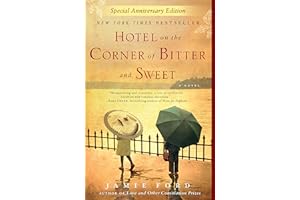Book Summary
‘Hotel on the Corner of Bitter and Sweet’ by Jamie Ford is a heartfelt historical fiction novel set in Seattle during World War II, following the story of a Chinese American boy named Henry and his unlikely friendship with a Japanese American girl named Keiko.
Book Genre
Historical fiction
Main Topic
The main topic of the book is the experience of Japanese Americans in the United States during World War II, particularly focusing on the internment of Japanese Americans and its impact on families and relationships.
Key Ideas
- The effects of racism and discrimination on individuals and society
- The struggle for identity and belonging in a time of war and cultural conflict
- The strength of love and loyalty in the face of adversity
- The importance of family and heritage in shaping one’s identity
Main Parts and Summary
- Part One: Hotel on the Corner – This section introduces the protagonist, Henry, as an older man in 1986 Seattle. He reflects on his past and his memories of the Panama Hotel, which holds significant meaning for him as it relates to his childhood and his friendship with Keiko. We are also introduced to Henry’s estranged son, Marty, and their strained relationship.
- Part Two: The Japanese Friendship Club – In the 1940s, Henry is a twelve-year-old boy living in the midst of the Japanese American community in Seattle’s Chinatown. He meets Keiko, a new student at his school, and they bond over their shared experiences of being caught between their Chinese and Japanese heritage. The two become close friends, but Henry’s father is opposed to their friendship, as he holds resentment towards the Japanese due to their country’s actions in the war.
- Part Three: Cedar Street and Beyond – In 1942, Japan enters the war and the United States government orders the internment of all Japanese Americans. Henry’s Japanese American neighbors and friends are sent to internment camps, including Keiko and her family. Henry struggles with the loss of his friend and his own feelings of guilt about not being able to speak out against the injustice.
- Part Four: Memories of So Long Ago – In the present day, Henry receives a call from the Panama Hotel’s current owner, who has discovered personal belongings of Japanese families who were forced to leave their homes during the war. Henry goes to the hotel and discovers a collection belonging to Keiko’s family, including a jazz album that holds sentimental value for their friendship.
- Part Five: Farewell Letters – The final section of the book flashes back to the 1940s and reveals the events leading up to Keiko’s family’s internment and her eventual removal to an internment camp in Idaho. We see how Henry and Keiko’s friendship evolves through their letters to each other and the struggles they face while separated.
Key Takeaways
- The lasting impact of historical events such as Japanese internment on individuals and families
- The importance of speaking out against injustice and standing up for what is right
- The power of personal connections and relationships to transcend cultural and societal barriers
- The complexity of identity and the need for acceptance and understanding of diverse backgrounds
Author’s Background and Qualifications
Jamie Ford is a Chinese American author who was born and raised in Seattle, Washington. He has a degree in English from the University of Washington and has worked as a creative director in advertising for over 20 years. ‘Hotel on the Corner of Bitter and Sweet’ is his debut novel, which was published in 2009 and won numerous awards, including the Asian/Pacific American Award for Literature.
Target Audience
‘Hotel on the Corner of Bitter and Sweet’ is suitable for adult readers who are interested in historical fiction and themes of race, love, and identity. It may especially resonate with readers who are interested in Japanese American history and the impact of World War II on communities.
Publisher and First Publication Date
The book was published by Ballantine Books in 2009.

